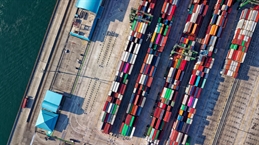
New research commissioned by Citi and undertaken by The Economist Intelligence Unit (EIU) finds that supply chains in the Asia Pacific region have been more resilient than expected despite supply chain-related shocks on the back of the Covid-19 pandemic.
The new report, Disruption, Digitisation, Resilience: The future of Asia-Pacific supply chains, is based on a survey of 175 global supply-chain managers across six primary industries — automotive, footwear and apparel, food and beverage, manufacturing, electronics, healthcare — and explores changes in supply-chain strategies in the Asia Pacific region. All respondents are involved in and/or have oversight of supply-chain decisions in the region.
Concerns on resilience of supplu chain lower in APAC
It said over half the supply-chain managers in Europe and North America say that increased concerns over the resilience of existing supply chains is the top factor driving their Asia Pacific supply-chain strategy, but just 3.2% of managers in Asia say so.
Instead, 46.4% of this group pick the ongoing impact of the pandemic as the top driver of their supply-chain strategy.
"This reflects in a more bullish view of globalisation and international supply chains among supply-chain managers in Asia Pacific. Only 9% of supply-chain managers in the region are concerned about a breakdown in global trade, compared to 52% of managers based in Europe and North America," it added.
"Supply chains in Asia Pacific appear to be relatively more resilient, but the pandemic is leading to a broader rethink of supply-chain strategies for the longer-term, the research finds."
The research noted that while longer-term changes in supply chains, dictated by geopolitical and economic factors, were already underway before the outbreak of the virus, the health crisis is accelerating these changes and leading companies to re-evaluate their strategies for the future.
It added that a third of all companies are conducting a complete overhaul of their supply chains, and these changes are geared towards the longer term. Only 22.9% of supply-chain managers say they are not making any significant changes to their supply-chain strategies.
"From a sectoral perspective, close to half or 48.3% of supply-chain managers in the automotive sector and 40% in the footwear and apparel industry are conducting an overhaul of their supply -chain strategy; higher than the survey average of 32.6%. This compares against 16.7% for the IT/tech/electronics industry, 23.1% for manufacturing, and 33.3% in both the food and beverage and healthcare/pharmaceutical/biotechnology sectors," the report said.
The result reflects how the automotive industry is taking the strongest hit as it faces production stoppages, trade restrictions and difficulties in access to primary inputs, it added.
Rethinking supply chains
The report found that how supply-chain managers are rethinking their supply chains varies in different regions. While 40% of managers in Europe and 48% in North America say their companies are pursuing diversification as their top supply-chain strategy, this share is just 24% among supply-chain managers in Asia Pacific.
"Supply-chain managers based in the Asia Pacific are pursuing a more diverse mix of strategies that includes diversification, localisation, reshoring and China-plus-one," the report said.
The pandemic has also resulted in a greater focus on the digitisation of supply chains and investments in technology for purposes.
The report noted that of all supply-chain managers surveyed, 32.5% say their companies have increased investment in digital tools or processes by more than 50% as a result of the pandemic.
While this number stands at 12% among managers in Europe and North America, it shoots up to a shade over 40% among managers in Asia — noting that these investments are largely in the areas of trade facilitation, forecasting and predicting, inventory management and manufacturing processes.
"Supply-chain managers based in the Asia Pacific region are clearly more optimistic about the resilience of the region’s supply chains than managers based elsewhere," said Chris Clague, Asia editorial lead, trade & globalisation at the EIU, and editor of the report.
"This stems from factors such as greater confidence in globalisation and a more nuanced understanding of different markets here. That said, the pandemic has resulted in companies thinking deeply about what its effects and longer-term geopolitical and economic trends might mean for the resilience of their supply chains."



